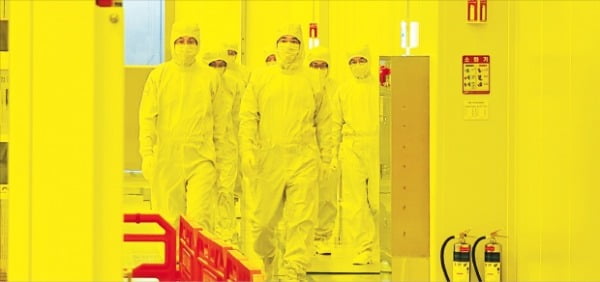
Samsung Electronics Vice Chairman Lee Jae-yong is inspecting a line dedicated to extreme ultraviolet (EUV) at the Pyeongtaek plant in Gyeonggi Province on the 4th. Provided by Samsung Electronics
“Investment equivalent to mergers and acquisitions (M&A).”
In June 2018, Samsung Electronics, a world-renowned authority in the field of artificial intelligence (AI), Sebastian Seung (Seung Hyeon-jun), Professor of Brain Science Research Center at Princeton University (currently President and President of Samsung Research) and Daniel Lee, Professor at the University of Pennsylvania (currently Director of New York AI Center, Samsung Research) ), etc. It was predicted that the effect of investing in AI research, including the recruitment of world-class scholars, would be as good as M&A. It was compared to Google’s acquiring of’Den Research’ to recruit AI scholar Jeffrey Hinton, a professor at the University of Toronto. President Seung discovers future growth engines through Samsung Electronics’ AI strategy establishment and prior research advice, and Lee is in charge of next-generation machine learning algorithms and robotics-related research.
Prerequisite research by establishing a global AI center
AI is known as one of the fields that Samsung Electronics Vice Chairman Lee Jae-yong designates as a future growth industry. In November 2019, Vice Chairman Lee met with President Seung, a professor at the University of Montreal in Canada, Yoshua Bengio, one of the world’s top four Gurus in the AI field to discuss the future AI industry development direction and Samsung Electronics’ AI strategy.
In November 2017, Samsung Electronics launched Samsung Research, an integrated research organization for Samsung Electronics, and established an AI center under its subsidiary to reinforce the role of leading AI-related research, which is the foundation technology of the 4th industrial revolution. AI research centers have been established in countries around the world, including Korea, and key research areas for each center have been determined. This is to prepare a system for in-depth research and synergy between centers. As of 2021, it operates AI centers in 7 regions including Korea, Silicon Valley and New York in the US, Cambridge in the UK, Toronto and Montreal in Canada, and Moscow in Russia.
The Institute of Technology, which was established for future basic research and advanced development of core source technologies, has also established AI bases at home and abroad to focus on research in the field of AI. Following the opening of the Montreal AI Lab in 2017, in May of last year, the Montreal AI Lab was expanded and moved to the location of the Mila Institute, a world-class AI research institute. Here, we are focusing on AI research applicable to next-generation system semiconductors.
Invested KRW 133 trillion in system semiconductors
System semiconductors play a key role in implementing optimized AI technology. Vice Chairman Lee’s first business move this year was also system semiconductor. On the 4th of the year, on the first working day of the new year, he attended a ceremony for bringing in production facilities to the foundry (consignment of semiconductor production) at the second plant in Pyeongtaek, Gyeonggi-do, and then checked the mid- to long-term strategy with the president of the semiconductor division.
Pyeongtaek Plant 2 is a high-tech complex production line that produces DRAM, next-generation V-NAND flash, and ultra-fine foundry products. Vice-Chairman Lee received reports on the construction and operation status of Pyeongtaek Line 2, the status of semiconductor investment and employment, and joint initiatives with partner companies. After inspecting the line dedicated to extreme ultraviolet (EUV), which is essential for the realization of ultra-fine semiconductor circuits, they visited the construction site of the Pyeongtaek Plant 3 and encouraged employees. Vice-Chairman Lee announced’Semiconductor Vision 2030′ in 2019, which will invest 133 trillion won to become the No. 1 system semiconductor by 2030, and is directly taking care of the system semiconductor business.
The effect of’AI scholars’ at CES
Investment results were also revealed at’CES 2021′, the world’s largest IT and home appliance show held on the 11th to 14th. President Seung introduced Samsung’s innovative products and AI-Internet of Things (IoT)-based services that take into account individual lifestyles and tastes, centering on houses that are playing more and more diverse roles in a new era.
‘Smart Things Cooking’ and’Samsung Health’ for smart TV have appeared as customized services based on AI. SmartThings Cooking is a service that manages the entire process from purchasing food ingredients to cooking according to individual preferences using the SmartThings app. It is expected to be introduced in Korea and the United States first in the first quarter of this year.
Samsung Health for Smart TV is a service that provides various types of high-definition home training contents such as stretching, strength training, yoga, and meditation. Through the’Smart Trainer’ function, users can check their posture accuracy, number of movements, and calories burned while watching their exercise with a USB camera connected to the TV.
Reporter Lee Soo-bin [email protected]
